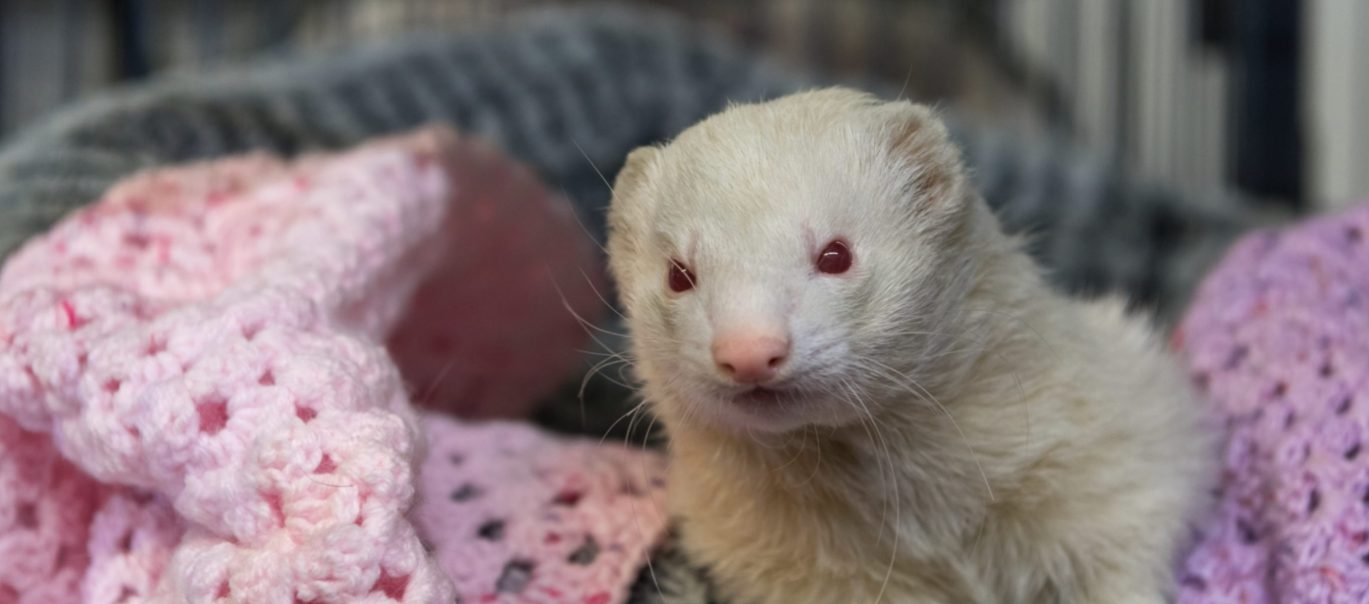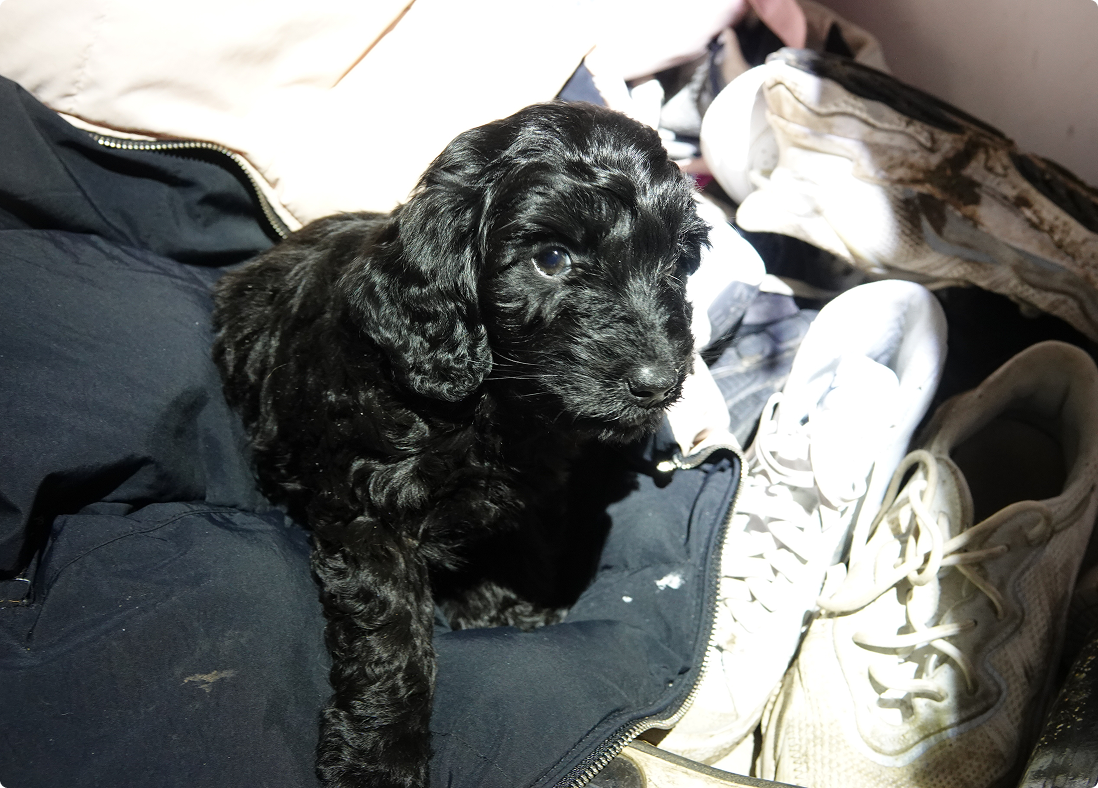
Caring for your ferrets
Ferrets are social animals who require a lot more mental stimulation and physical exercise than many people realise.
On this page:
Ferrets are social animals who require a lot more mental stimulation and physical exercise than many people realise. Owners have a duty of care towards their pets and the welfare of your ferret(s).
Accommodation
Whether they live indoors or outdoors, ferrets require a spacious cage with multiple levels for exercise and exploration. The more ferrets you have, the bigger space you’ll need.
Make sure the cage bars are narrow enough to prevent escapes. It should also be easy to clean to maintain good hygiene. Some owners even convert their shed into a custom ferret house!
Ferrets are sensitive to extreme temperatures so it’s recommended to keep their environment between 15 to24°C to ensure their comfort. They also like to burrow to feel safe so make sure you provide a choice of dark and cosy areas where they can snuggle up and rest. Cat beds, enclosed hammocks, hats, sacks and blankets make perfect places to curl up and rest.
Ferrets are natural explorers and can easily get into trouble. You can ‘ferret-proof’ your home by securing electrical cords, blocking off small spaces, and removing toxic plants or substances.
Ferrets are very inquisitive and playful pets. Try putting different items like tubes and tunnels; climbing ladders and ropes; sandpits and paddling pools; and hammocks, scratching posts and toys in their enclosure to turn it into an adventure playground. Adding new toys and changing the items regularly will keep your ferrets happy. They love a challenge.
Remember to check regularly for signs of damage such as chewed wood, gaps in the mesh or staples sticking out. These can cause injury or allow your ferrets to escape.
Diet
A good diet keeps ferrets healthy and can even be a form of enrichment. They have an extremely fast metabolism and need to eat regularly throughout the day to avoid becoming hypoglycaemic. For dietary advice specific to your ferrets’ needs, or if you notice any changes to their eating habits, please consult your vet.
What can I give my ferrets to eat?
Ferrets are carnivores and must be fed a well-balanced, meat-based diet to keep them healthy and cannot be given a vegetarian diet.
Theyenjoy a good quality dry ferret mix that’s suitable for their age and activity levels. Some tasty treats include salmon oil, raw eggs and vitamin paste. Never feed your ferrets live animals.
Your vet will be able to recommend a suitable complete food for your ferret.
Ferrets like to stash their food. Check their enclosure regularly for any hidden food as this could attract flies and rodents.
What can I give my ferrets to drink?
Ferrets can very quickly get thirsty so always need plenty of fresh water to drink. We recommend checking their water supply twice a day. Never give your ferrets milk as they are lactose intolerant.
Choosing the right drinking equipment can be tricky. Some ferrets can struggle to drink from bottles or even chip their teeth; others will tip their water bowl over or splash around in it. You may need to try different types and sizes to find out what suits your ferrets best. If your ferrets live outdoors, watch out for their water freezing in the winter. Remember to top up more often during spells of hot weather.
Which foods are unsafe for ferrets?
Ferrets have sensitive digestive systems. Limit treats and avoid sugary, fatty or starchy snacks. Stick to meat-based treats or eggs and only give them sparingly.
How much should I feed my ferrets and how often?
The amount your ferrets need to eat depends on their age, body weight and activity levels.
Always check the packaging for feeding instructions and be careful not to offer too many treats. If you are concerned that one ferret is getting more food than the others are, try setting up different feeding areas or separating them during feeding.
Ferrets naturally gain up to 30% of their body weight in the winter and lose it again in the Spring/Summer season. If your ferrets are unexpectedly gaining or losing weight, your vet will be able to advise if any dietary changes are required.
If you need to adjust your ferret’s diet, make sure any changes are made gradually. Sudden changes can upset their digestive system.
Exercise and play
Ferrets enjoy human company. Ferrets need daily handling and interactive play sessions. Giving them as much time out of their enclosure as possible to explore and play will encourage them to form a lasting bond with you and your family.
It’s always better to handle your pets when you are feeling relaxed and confident as ferrets are very sensitive and will detect tension.
To pick up your ferret safely, place one hand under their front legs and support their bottom with your other hand. If your ferret seems uncomfortable, put them down straight away.
Taking your ferret for a walk is a great way to keep their body and mind active. Ensure you have a secure and comfortable harness. ‘Figure of eight’ leads can also be easily made.
Grooming
Ferrets keep themselves clean, and may even groom other ferrets they live with.
Your ferrets might need extra help to get rid of excess fur if they have longer hair or struggle to groom themselves, particularly during the shedding season. Using a comb or cloth to remove dead fur can help prevent fur balls. Feeding your ferrets an appropriate high-protein diet helps keep their coats in good condition.
Ferrets have a natural musky odour but excessive bathing can strip their skin of essential oils. Only bathe them when necessary using warm water, typically two or three times a year. Adding oats to your ferret’s bath can help soother their skin.
Nail clipping
Ferrets’ nails grow continuously and so they will need to be clipped regularly. If left unclipped, long nails can get caught in blankets, toys or the mesh of their enclosure. In serious cases, overgrown nails can make walking very uncomfortable and lead to joint and back problems.
Nail clipping is a straightforward task that can be made even simpler if someone helps you. It may help to put your ferret on their back and distract them with a tasty treat like salmon oil or vitamin paste on their tummy. If you aren’t able to do it yourself, speak to your vet.
Litter training
Ferrets can be trained to use a litter tray. Place the litter tray in an area that your ferret has been going to the toilet, usually a corner, and line it with newspaper or linoleum. Fill the tray with shredded paper or small stones. Pebbles will also help to wear down your ferrets’ nails naturally.
If your ferret is unsure, try putting some of their droppings in the tray to coax them in. If you notice your ferret lifting their tail to go to the toilet, put them in the litter tray rear end first.

Puppies across Scotland need your help
Please consider giving a monthly donation today. Give Scotland’s animals the gift of safety this winter and beyond. The criminals involved in the low-welfare puppy trade never stop. And with your help, neither will we. Every £1 matters to puppies like Winnie.